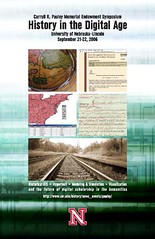Last month, the University of Nebraska held a symposium on "History in the Digital Age". Sounds interesting. So what is digital history?
One of the symposium sponsors was the Nebraska University Center for Digital Research in the Humanities. Their (rather vague) mission statement is to advance "interdisciplinary research in the humanities by creating unique digital content, developing tools to assist scholars in text analysis and visualization, and encouraging the use (and refinement) of international standards for humanities computing". One of their resources is a searchable database of newspaper articles relating to the Birds of Nebraska, and another is the Early Treaties with American Indians. While the first simply presents the newspaper articles in text form, at least the second has scanned images of pages from an 1855 book as well as parallel ASCII text.
The University of Virginia's Center for Digital History was also represented at the symposium. Their mission statement is a little more focused, promoting "the teaching and learning of history using digital technologies". Again, there don't appear to be scans of original sources in their flagship Valley of the Shadow project; but the digitised text of letters, diaries and publications from the 1860s is joined by some slick animated battle plans.
In an earlier post, I asked what form digital scholarship should take. Perhaps digitising sources (ideally primary sources, as in the Virginia example) and posting them on the internet so that they can be searched is as good as it gets. But then, by that stage, hasn't the scholarship already taken place?

What I miss about digital scholarship is some sort of quality control. Of course, I disagree with some academic non fiction books, but at least they usually get the facts right and it's the conclusions I disagree with, and those books are reviewed so you can get a feedback on their reliability. But with a site like Wikipedia, everyone and his uncle can screw around, it has more mistakes (and I mean wrong stuff presented as facts) than a Swiss cheese has holes, and the worst, people keep quoting Wikipedia articles like it's god's own truth. I've become very misgiving towards historical websites thanks to Wikipedia, though there are probably some good ones. What we need is reviews of websites done by people who know the matter and have no financial interest in the site. Collected somewhere for everyone to find.
ReplyDeleteI know exactly what you mean, Gabriele. But the sites I looked at were hosted by University history departments, so the material was probably accurate.
ReplyDeleteBut I just wonder what's so marvellous about a "digital" version of (say) Civil War correspondence. The guy with the scanner has done all the "scholarship" -- s/he has selected the bits that s/he thinks are important, for inclusion in the web site. Exactly what bit of that is groundbreaking?! I really can't see what all the hoopla's about!
I think it's to do with making information easily available to everyone, not just scholars. I would take selected items from Civil war Correspondence as a place to start, but not the be-all and end-all of what was available. Others may stop at the selection. But as you say, what about the quality?
ReplyDeleteIt's not all to do with sources, particularly in archaeology, for example there is the Archaeology Data Service (http://ads.ahds.ac.uk/), which is a god-send for finding archaeological grey literature, datasets, and out of print monographs (just a few though).